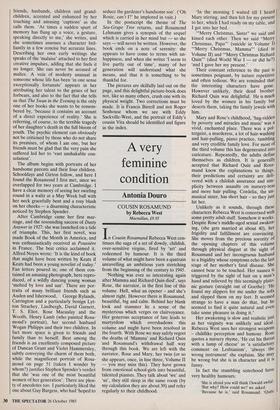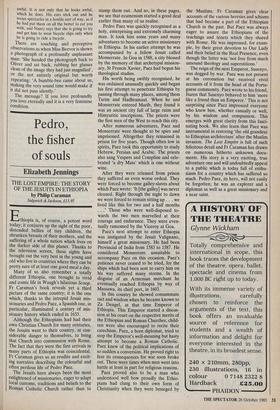A very feminine condition
Antonia Douro
COUSIN ROSAMUND by Rebecca West
Macmillan, £9.95
In Cousin Rosamund Rebecca West con- tinues the saga of a set of dowdy, childish, over-sensitive virgins, fired by 'are and redeemed by humour. It is the third volume of what might have been a quatrain unravelling an ambitious yarn stretching from the beginning of the century to 1945.
`Nothing was ever so interesting again after Mamma and Richard Quin died', says Rose, the narrator, in the first line of this volume. Hell, what an opener – and she's almost right. However there is Rosamund, beautiful, big and calm. Behind her blank look and stammer lie a sense of the mysterious which verges on clairvoyance. Her generous acceptance of fate leads to martyrdom which overshadows this volume and might have been resolved in the fourth. With Rose we may safely regret the deaths of 'Mamma' and Richard Quin and Rosamund's withdrawal half way through this book. We are left with the narrator, Rose and Mary, her twin (or so she appears, once, in line three, Volume II — you may miss this). They have grown from emotional school-girls into beautiful, talented pianists. They talk about 'we' and `us', they still sleep in the same room (by my calculation they are about 30) and refer regularly to their childhood. `In the morning I waited till I heard Mary stirring, and then felt for my present to her, which I had ready on my table, and I got into her bed. "Merry Christmas, Sister" we said and kissed each other. Then we said "Merry Christmas, Papa"' (suicide in Volume I) "Merry Christmas, Mamma"' (died in Volume II) and "Merry Christmas Richard Quin"' (died World War I — or did he?) `and I gave her my present.' Their constant reference to the past is sometimes poignant, by nature repetitive and often tedious. We are reminded that the interesting characters have gone. However unlikely, their dead brother Richard Quin was delightful. He is much loved by the women in his family but deserts them, taking the family jewels with him.
Mary and Rose's childhood, 'hag-ridden by poverty and miracles and music' was a vivid, enchanted place. There was a pol- tergeist, a murderess, a lot of hair-washing and hair-pulling, piano practice, tumbling and very credible family love. For most of the third volume this has degenerated into caricature. Repeatedly, the adults define themselves as children. It is generally accepted that Richard Quin and Rosa- mund know the explanations to things, their predictions and certainty are deli- vered with a childish assurance and sim- plicity between assaults on nursery-teas and more hair pulling. Cordelia, the un- musical sister, has short hair – so they just hit her.
Unlikely as it sounds, through these characters Rebecca West is concerned with some pretty adult stuff. Somehow it works. Despite Rose's middle-aged sexual awaken- ing, (she gets married at about 40), her frigidity and fulfillment are convincing- She moves from the precious sorority of the opening chapters of this volume through physical disgust at the sight of Rosamund and her incongruous husband to a frigidity whose symptoms echo the last stage of her mother's fatal disease. She cannot bear to be touched. Her nausea is triggered by the sight of hair on a man's hand and relieved by this seemingly plato- nic gesture (straight out of Goethe): 'He found my slippers for me under the sofa and slipped them on my feet. It seemed strange to have a man do that, but be seemed to find it quite natural and even take some pleasure in doing it.' Her awakening is slow and realistic just as her virginity was unlikely and ideal. Rebecca West uses her strongest weapons – childlike perception and humour. Rose quotes a nursery rhyme, 'He cut his throat with a lump of cheese' as 'a satisfactory comment on Lesbianism', 'always the wrong instrument' she explains. She may be wrong but she is in character and it is funny. In fact the stumbling sisterhood have very healthy humours:
She is afraid you will think Oswald awful'. 'But why? How could we? we asked. 'Because he is,' said Rosamund. 'Quite awful. It is not only that he looks awful, which he does. His ears stick out and he wears spectacles in a hostile sort of way, as if he had put them on all the better to eat you with, and Nancy says that she is going to try and get him to wear bicycle clips only when he is going to ride a bicycle.
There are touching and perceptive observations as when Miss Beevor is shown a photograph of a profoundly unpleasant man: 'She handed the photograph back to Oliver and sat back, rubbing her glasses clean of the image they had just magnified', or the not entirely original but worth repeating: 'A bumble-bee came about us, making the very sound time would make if it did not pass silently.' The message? If you love profoundly you love eternally and it is a very feminine condition.



























































 Previous page
Previous page